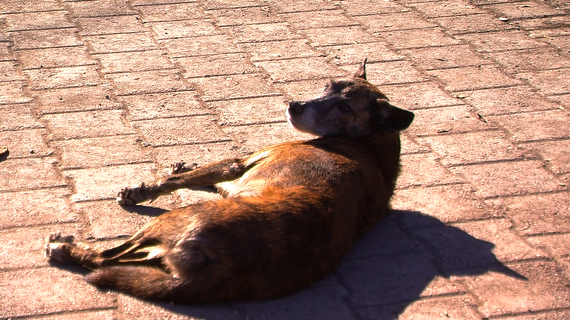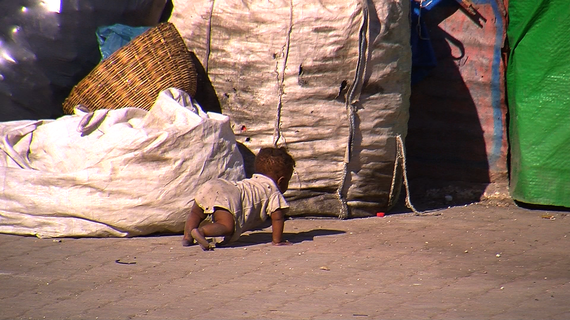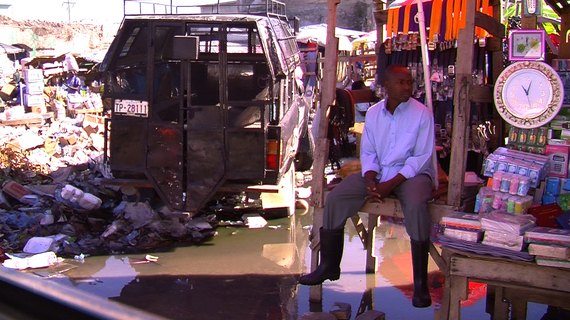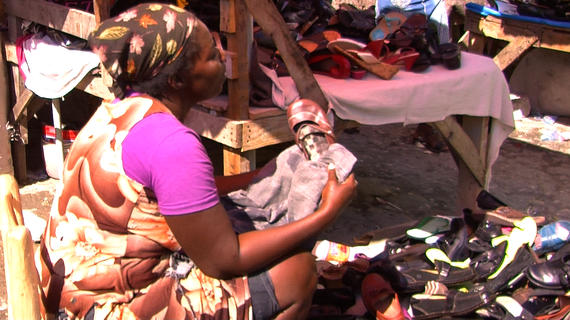I woke up to the sound of birds and faint traffic. It was a beautiful morning in Port au Prince, which, to be honest, I never would have imagined I would ever experience. The shower had better water pressure than I have had at most U.S. hotels, a rather nice surprise. I got dressed, checked to make sure all of the camera batteries were charged, and left my room to grab breakfast.
Wayne was already down, as was Sammy, Wayne's friend. With an Alabama drawl and an infectious smile, Sammy endeared himself to Todd and I immediately. He also reminded Todd of Dave "Yuuup!" Hester of Storage Wars. This would really come into play later in the trip.
Speaking of Todd, he had yet to come down. The rest of us helped ourselves to the breakfast buffet, and the spread was amazing. Eggs, hash browns, and any kind of fresh fruit you could imagine were there, as was fresh coffee, orange juice, and bottles of water. I did not know I'd be eating so remarkably well on this trip, but the hotel meals were two for two on the awesome scale.
As we were half way through, Todd made it down. The man is so tan and so buff, and with those teeth so dazzlingly white, I asked if he had to plug them in on a nightly basis to recharge. I was met with a finger, an expletive, and a smile. Sammy said, 'Well, you are pretty damn gorgeous." This was my type of crowd.
Annie would meet us in 20 minutes with our guard. It's hard to describe just how amazing, or crazy, Annie really is, and how you feel depends on your outlook. From Haiti originally, she met her husband in college. They fell in love, got married, and they had all boys. They were living a really, really good life in San Francisco, and their future was set.
And then the 2010 earthquake destroyed her home city. She felt so compelled to make a difference that she convinced her husband and sons to move back to Port au Prince. What made this even more unbelievable was that the family home, what Haitians call a "Gingerbread House," was occupied by a renter and would be for the next few years. Annie's family would have to live in a one bedroom small apartment until the lease was eventually up, and that was okay with her.
She was either very brave, convicted, or slightly bat shit... and probably a mixture of the three. My thought: she has more guts than I could ever imagine. And if I was one of her sons, I'd be pissed.
Annie arrived while I was away in my room getting the camera ready. It was a pretty cool setup. I had a small but powerful JVC HD camera, with a Sennheiser boom microphone attached to the camera and a matching wireless lavalier microphone for interviews. I could hold everything in my hands, and keep three extra batteries in my pockets. It was an utter "guerrilla" rig... perfect for shooting in cramped places as well as the open space of a tent city, which was our first stop. We needed no truck to get there; it was directly across the street from our hotel.
The first thing I noticed when I walked across the bustling road was a dog that seriously could have been my dog Bear's twin, and those of you who know Bear know that he's a pretty unusual-looking dog. This one was sunning himself on the top step of what used to be a communal amphitheater. Now, it was filled with tents made out of canvas, plastic tarps and corrugated metal. The dog gave me a look right in the eye as if to say, "Go on. It's not what you think it is. All will be okay." And then he put his head back down and passed out. Looking back, it was... as my friend Teri Griege calls it... a "God-wink."
The second thing I noticed was the smell... a smell so abysmal that I was forced to breathe through my mouth. In fact, if you were to look at the raw footage, you could tell every time that I slipped and breathed through my nostrils, because the camera goes back a little bit, like I've just been hit in the face.
As I got used to breathing, Todd tapped me on the shoulder. "I don't know if we should film this, but look."
He pointed across the theater to a little boy wearing an old dirty onesie. This was the only thing he was wearing as he moved across the concrete to a tent. Brilliantly, and out of necessity, this little one-year-old had learned that foot skin is much tougher than knee skin, so instead of crawling on hands and knees, he bear-crawled. Looking through the viewfinder, I really couldn't quite comprehend what I was seeing.
We stayed about 20 minutes in this particular tent city. We did a stand-up interview with Todd, and even took some footage of a conversation that he had with a couple of the residents who spoke English very well. They told us of the lack of any basic needs, and how they held out hope that one day it would get better, though they didn't trust the government. Sound familiar? Yet his word "hope" really struck me because, to me, I was standing in the middle of one of the most hopeless situations I'd ever seen with my own eyes.
After our first conversation, Annie walked us over to the truck, and we set off for the market in the heart of Port au Prince. I was absolutely not prepared for anything that I experienced.
For starters, I found it a bit unnerving being stared at. Let's face it: we were the only white faces in the entire market. We stood out. Now normally in the U.S., even when you stand out, people tend to keep to themselves. Very rarely do I find that people actually look up when they pass each other on the street in America.
In Haiti, there is no personal space, and when someone looks at you, it's right in the eye, and they don't break contact. Our group of four, flanked by the ballsiest woman I know and a six-five Haitian policeman with a gun, was being stared at by literally hundreds of people every second. And because I'm holding a bunch of camera gear, I can only really see what I'm filming... and everyone is looking at me through the viewfinder. I had no opportunity to look back, to complete the interaction.
For a brief few moments, I thought we were going to be approached for the camera gear, as so many of my videographer friends have been in our own country. My friend Bill from D.C. said, "Ya know, Dan, I've filmed all over the world in some pretty wild places, but the only time I was ever really scared was shooting b-roll for The Wire in Baltimore. There, you really felt like you were taking your life in your hands."
But once I was in the thick of this adventure for a minute or two, my fear lifted away. No one messed with us, no one approached us, and in fact, quite a few smiled at Wayne. They knew him. They knew he was here to help. And we were good enough for Wayne, so we were good enough for them.
There were three things that really stuck out to me about the market. First, there was an abundance of food. Everywhere I looked, there were vegetables and fruits and seafood of all kinds. Some women had cabbage and carrots, and they were making a non-mayonnaise, super hot version of coleslaw that was not only beautiful, but out of this world tasty.
Second, not too many people were buying the food. Food costs money. Very few people in Haiti actually have any money, so they have to barter. However, if you don't have anything that the food vendors want to barter with, they won't sell you anything. And if the food vendors don't sell the food, it rots.
And honestly, that's where a large chunk of the smell in downtown Port au Prince comes from: rotting food. Before we even got to the market, I can't tell you how many piles of rot at least five feet high we drove past. And because garbage pick-up is spotty at best, therein lies the issue.
But the most bizarre thing that popped out at me in our time in Port au Prince was the gray water. No matter where you walk, there's this gray water. When I asked Annie the last time it rained, she said, "There's been nothing in the last week." When I asked if any of this was storm water, she shook her head from right to left.
At that point, Wayne said, "And now you see why shoes are so important. Shoes are a barrier between life and death for some of these people. Imagine if you had an open cut on the bottom of your foot and you stepped in that. How long do you think you would last?"
Wayne told me so many stories that day. Two months prior, there was the story of a woman who traded a pair of shoes for a goat because she was too malnourished to produce milk for her newborn. Shoes weren't just life-saving implements for some of these folks... they were currency. In fact, you could get a decent amount of food from a vendor with a single pair shoes.
In another part of the market where shoes were being sold, women would clean them, polish them, and put paper in them. Todd said it really well: "Everybody deserves to have the feeling of a new pair of shoes."
When we asked Wayne about what types of shoes are needed, he said, "All kinds. Even women's heels. A woman can buy a pair of heels, and if she has a dress, she can apply for administrative work if she has the skills, as opposed to something more labor intensive like housecleaning." It automatically brought me back to St. Louis, to my friend Ali Kindle who owns a shop called Rung. They help to pair unemployed and underemployed women who need business clothes for work, with outfits they can use and would otherwise not be able to afford.
But the one thing I learned from Wayne was something he said at the end of an interview we filmed in the market. As I turned off my camera, I asked him, "Wayne, do you not feel it kind of odd that I, who co-founded a charitable mission to help cancer patients, am helping you, who founded a wildly successful mission to put shoes on the neediest people around the world? Aren't we kind of competing for dollars, in a sense?"
He simply said this: "Dan, you're not my competition. Even other shoe organizations are not my competition. Right now, there are 287 million people on this earth without a single pair of shoes. My only competition is time."
It's why today, as co-founder of The Half Fund, I have no qualms about helping Teri Griege with Powered by Hope, or Matt Zachary with Stupid Cancer, or Cara Paymaster with Hope 4 Young Adults With Cancer. Or April Dzubic from the American Cancer Society. Or Renata Sledge from the Cancer Support Community. We are not competitors. We are all in this together.
That was the re-ignition of the fire in me to want to make the world a better place... something that would almost be extinguished just two hours later.




